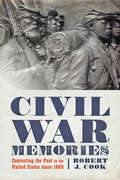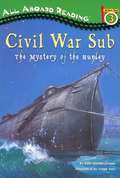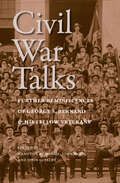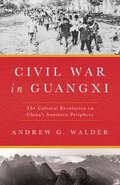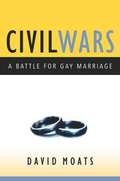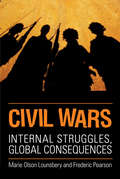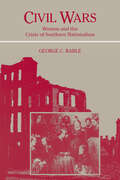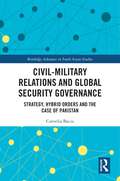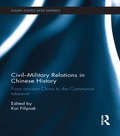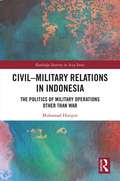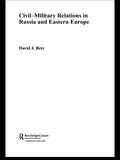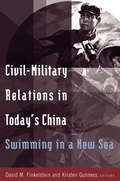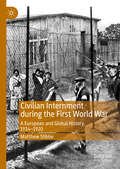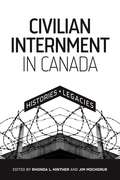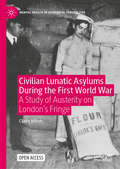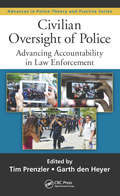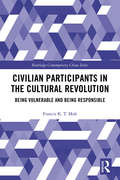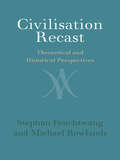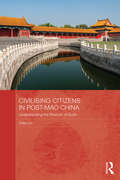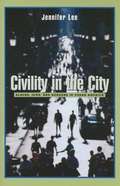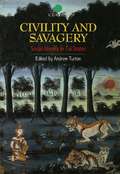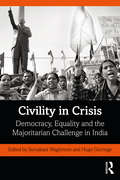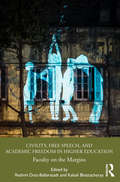- Table View
- List View
Civil War Memories: Contesting the Past in the United States since 1865
by Robert J. Cook“Cook makes clear the powerful ways that the reverberations of the Civil War still resonate within American political culture. A compelling story.” —Joan Waugh, author of U. S. GrantWinner of the 2018 Book Prize in American Studies of the British Association of American StudiesAt a cost of at least 800,000 lives, the Civil War preserved the Union, aborted the breakaway Confederacy, and liberated a race of slaves. Civil War Memories is the first comprehensive account of how and why Americans have selectively remembered, and forgotten, this watershed conflict since its conclusion in 1865. Drawing on an array of textual and visual sources as well as a wide range of modern scholarship on Civil War memory, Robert J. Cook charts the construction of four dominant narratives by the ordinary men and women, as well as the statesmen and generals, who lived through the struggle and its tumultuous aftermath.Part One explains why the Yankee victors’ memory of the “War of the Rebellion” drove political conflict into the 1890s, then waned with the passing of the soldiers who had saved the republic. Part Two demonstrates the Civil War’s capacity to thrill twentieth-century Americans in movies such as The Birth of a Nation and Gone with the Wind. It also reveals the war’s vital connection to the black freedom struggle in the modern era. Written in vigorous prose for a wide audience and designed to inform popular debate on the relevance of the Civil War to the racial politics of modern America, Civil War Memories is required reading for informed Americans today.“Fast-paced, well-researched, and gripping.” —John David Smith, author of A Just and Lasting Peace
Civil War Sub: The Mystery of the Hunley
by Kate Boehm JeromeRecounts events surrounding the mysterious sinking of the Confederate submarine, the H.L. Hunley, and its recent recovery from deep in the waters off the coast of South Carolina.
Civil War Talks: Further Reminiscences of George S. Bernard and His Fellow Veterans (A Nation Divided)
by George S. BernardGeorge S. Bernard was a Petersburg lawyer and member of the 12th Virginia Infantry Regiment during the Civil War. Over the course of his life, Bernard wrote extensively about his wartime experiences and collected accounts from other veterans. In 1892, he published War Talks of Confederate Veterans, a collection of firsthand accounts focusing on the battles and campaigns of the 12th Virginia that is widely read to this day. Bernard prepared a second volume but was never able to publish it. After his death in 1912, his papers became scattered or simply lost. But a series of finds, culminating with the discovery of a cache of papers in Roanoke in 2004, have made it possible to reconstruct a complete manuscript of the unpublished second volume.The resulting book, Civil War Talks, contains speeches, letters, Bernard’s wartime diary, and other firsthand accounts of the war not only by veterans of the Confederacy, such as General William Mahone, but by Union veterans as well. Their personal stories cover the major military campaigns in Virginia, Maryland, and Pennsylvania--Seven Pines, Malvern Hill, Gettysburg, Wilderness, Spotsylvania, Petersburg, and Appomattox. For the general reader, this volume offers evocative testimonies focusing on the experiences of individual soldiers. For scholars, it provides convenient access to many accounts that, until now, have not been widely available or have been simply unknown.
Civil War in Guangxi: The Cultural Revolution on China's Southern Periphery
by Andrew G. WalderGuangxi, a region on China's southern border with Vietnam, has a large population of ethnic minorities and a history of rebellion and intergroup conflict. In the summer of 1968, during the high tide of the Cultural Revolution, it became notorious as the site of the most severe and extensive violence observed anywhere in China during that period of upheaval. Several cities saw urban combat resembling civil war, while waves of mass killings in rural communities generated enormous death tolls. More than one hundred thousand died in a few short months. These events have been chronicled in sensational accounts that include horrific descriptions of gruesome murders, sexual violence, and even cannibalism. Only recently have scholars tried to explain why Guangxi was so much more violent than other regions. With evidence from a vast collection of classified materials compiled during an investigation by the Chinese government in the 1980s, this book reconsiders explanations that draw parallels with ethnic cleansing in Rwanda, Bosnia, and other settings. It reveals mass killings as the byproduct of an intense top-down mobilization of rural militia against a stubborn factional insurgency, resembling brutal counterinsurgency campaigns in a variety of settings. Moving methodically through the evidence, Andrew Walder provides a groundbreaking new analysis of one the most shocking chapters of the Cultural Revolution.
Civil Wars: A Battle for Gay marriage
by David MoatsStory of battle over same-sex marriage in Vermont written by Pulitzer Prize-winning journalist who covered the story.
Civil Wars: Internal Struggles, Global Consequences
by Marie Olson Lounsbery Fred PearsonWhat motivates individuals to take up arms against their government? What types of states have historically been more prone to internal conflicts? In Civil Wars: Internal Struggles, Global Consequences Marie Olson Lounsbery and Frederic Pearson explore these questions and present a comprehensive analysis of the causes, consequences, and management potential regarding civil wars throughout the world.
Civil Wars: Women and the Crisis of Southern Nationalism (Women, Gender, and Sexuality in American History)
by George C. RableBorn into a male-dominated society, southern women often chose to support patriarchy and their own celebrated roles as mothers, wives, and guardians of the home and humane values. George C. Rable uncovers the details of how women fit into the South's complex social order and how Southern social assumptions shaped their attitudes toward themselves, their families, and society as a whole. He reveals a bafflingly intricate social order and the ways the South's surprisingly diverse women shaped their own lives and minds despite strict boundaries. Paying particular attention to women during the Civil War, Roble illuminates their thoughts on the conflict and the threats and challenges they faced and looks at their place in both the economy and politics of the Confederacy. He also ranges back to the antebellum era and forward to postwar South, when women quickly acquiesced to the old patriarchal system but nonetheless lived lives changed forever by the war.
Civil-Military Relations and Global Security Governance: Strategy, Hybrid Orders and the Case of Pakistan (Routledge Advances in South Asian Studies #44)
by Cornelia BaciuThis book investigates the relationship between international security governance, democratic civil-military relations and the relevance of strategy, as well as of absolute and relative gains, in norms formation in hybrid orders. Highlighting caveats of the legacy of Huntington’s paradigm of military professionalism, the book applies a robust methodology and data collected in four sample regions in Pakistan. It gauges the effects of international and local actors’ support in the Security Sector Reform domain and examines instances of civil-military interactions and military transition. The book also analyses determinants and strategies that can influence them to demonstrate the impact of global governance in norms diffusion, as well as of absolute and relative utility gains and incentives in normative change. The author generates a new theory pertaining to international organisations and actors as determinants of transformation processes and consequently sheds new light on the issue of global security governance, especially its impact on civil-military relations and democratisation in hybrid orders. The book will be of interest to scholars and practitioners in the field of global governance, civil-military relations, grand strategy and foreign policy as well as Asian politics, South Asian studies, peace, security and strategic studies, International Relations and political science in more general.
Civil-Military Relations in Chinese History: From Ancient China to the Communist Takeover (Asian States and Empires)
by Kai FilipiakModern studies of civil--military relations recognise that the military is separate from civil society, with its own norms and values, principles of organization, and regulations. Key issues of concern include the means by which – and the extent to which – the civil power controls the military; and also the ways in which military values and approaches permeate and affect wider society. This book examines these issues in relation to China, covering the full range of Chinese history from the Zhou, Qin, and Han dynasties up to the Communist takeover in 1949. It traces how civil--military relations were different in different periods, explores how military specialization and professionalization developed, and reveals how military weakness often occurred when the civil authority with weak policies exerted power over the military. Overall, the book shows how attitudes to the military’s role in present day Communist China were forged in earlier periods.
Civil-Military Relations in Indonesia: The Politics of Military Operations Other Than War (Routledge Security in Asia Series)
by Muhamad HaripinThis book examines military operations other than war (MOOTW) of the Indonesian military in the post-Suharto period and argues that the twin development of democratic consolidation, marked by ‘stable’ civil–military relations from 2004 to 2014 under Susilo Bambang Yudhoyono’s presidency, and internationalization of the military have not yet entirely de-politicized the armed forces. This book shows how peacekeeping, humanitarian assistance and disaster relief, and counter-terror missions have been reinvented by the Indonesian military (Tentara Nasional Indonesia, TNI) to adhere to its politico-institutional interests rather than to divert military attention from politics. In contrast with conventional arguments about the rationale of MOOTW in promoting military professionalism, this book provides the first critical analysis of the development of these missions and correlates them with TNI’s concerted effort to preserve territorial command structure – a military network that parallels the civilian bureaucracy down to the village level. The book argues that the military in Indonesia remains domestically political amidst high intensity of international activism. A detailed investigation of civil–military relations in Indonesia, this book will be of interest to scholars in the fields of Southeast Asian studies and Asian politics, and more generally to those interested in civil–military relations, military politics, and MOOTW.
Civil-Military Relations in Russia and Eastern Europe
by David BetzThis book examines how civil-military relations have been transformed in Russia, Poland, Hungary and Ukraine since the collapse of the Soviet Union and the Warsaw Pact in 1991. It shows how these countries have worked to reform their obsolete armed forces, and bring them into line with the new economic and strategic realities of the post-Cold War world, with new bureaucratic structures in which civilians play the key policy-making roles, and with strengthened democratic political institutions which have the right to oversee the armed forces.
Civil-military Relations in Today's China: Swimming in a New Sea (East Gate Books)
by David M. Finkelstein Kristen GunnessThis work provides an in-depth and up-to-date examination of civil-military relations in China. It reflects the significant changes taking place in Chinese society and their impact on the civil-military dynamic, with particular attention to how the military will fit in with the new class of entrepreneurs. Rather than focusing exclusively on elite Party-Army relations, the book examines civil-military relations from various vantage points: at "the center" and in the provinces; between civilian leaders and military leaders; from a strictly military perspective and from a civilian perspective; and from the angle of specific issue areas. Chapters explore issues, such as the impact of AIDS, the defense budget, the emerging dynamic between the military and China's new leadership, resettling demobilized troops back into civilian life, and the role of the militia, reserve units, and other civilian groups. The contributors are highly respected specialists in China studies, including political scientists, historians, PLA specialists, and sociologists. They present a vibrant portrait of the new civil-military dynamic in the PRC within the complex social changes that China is exploring today.
Civilian Internment during the First World War: A European and Global History, 1914—1920
by Matthew StibbeThis book is the first major study of civilian internment during the First World War as both a European and global phenomenon. Based on research spanning twenty-eight archives in seven countries, this study explores the connections and continuities, as well as ruptures, between different internment systems at the local, national, regional and imperial levels. Arguing that the years 1914-20 mark the essential turning point in the transnational and international history of the detention camp, this book demonstrates that wartime civilian captivity was inextricably bound up with questions of power, world order and inequalities based on class, race and gender. It also contends that engagement with internees led to new forms of international activism and generated new types of transnational knowledge in the spheres of medicine, law, citizenship and neutrality. Finally, an epilogue explains how and why First World War internment is crucial to understanding the world we live in today.
Civilian Internment in Canada: Histories and Legacies (Human Rights and Social Justice Series #2)
by Rhonda L. Hinther Jim MochorukCivilian Internment in Canada initiates a conversation about not only internment, but also about the laws and procedures—past and present— which allow the state to disregard the basic civil liberties of some of its most vulnerable citizens. Exploring the connections, contrasts, and continuities across the broad range of civilian internments in Canada, this collection seeks to begin a conversation about the laws and procedures that allow the state to criminalize and deny the basic civil liberties of some of its most vulnerable citizens. It brings together multiple perspectives on the varied internment experiences of Canadians and others from the days of World War One to the present. This volume offers a unique blend of personal memoirs of “survivors” and their descendants, alongside the work of community activists, public historians, and scholars, all of whom raise questions about how and why in Canada basic civil liberties have been (and, in some cases, continue to be) denied to certain groups in times of perceived national crises.
Civilian Lunatic Asylums During the First World War: A Study of Austerity on London's Fringe (Mental Health in Historical Perspective)
by Claire HiltonThis open access book explores the history of asylums and their civilian patients during the First World War, focusing on the effects of wartime austerity and deprivation on the provision of care. While a substantial body of literature on ‘shell shock’ exists, this study uncovers the mental wellbeing of civilians during the war. It provides the first comprehensive account of wartime asylums in London, challenging the commonly held view that changes in psychiatric care for civilians post-war were linked mainly to soldiers’ experiences and treatment. Drawing extensively on archival and published sources, this book examines the impact of medical, scientific, political, cultural and social change on civilian asylums. It compares four asylums in London, each distinct in terms of their priorities and the diversity of their patients. Revealing the histories of the 100,000 civilian patients who were institutionalised during the First World War, this book offers new insights into decision-making and prioritisation of healthcare in times of austerity, and the myriad factors which inform this.
Civilian Oversight of Police: Advancing Accountability in Law Enforcement (Advances in Police Theory and Practice)
by Tim Prenzler Garth Den HeyerExploring the complex and controversial topic of civilian oversight of police, this book analyzes the issues and debates entailed by civilian oversight by using worldwide perspectives, in-depth case studies, and a wealth of survey data. It integrates and summarizes decades of research from many locations around the globe to present a best practices model for managing police conduct. It also describes the impact of oversight agencies on police policy, including innovative means by which agencies can work with police departments to improve police conduct.
Civilian Participants in the Cultural Revolution: Being Vulnerable and Being Responsible (Routledge Contemporary China Series)
by Francis K. MokIn the ten years of the Cultural Revolution, political persecutions, violation of rights, deprivation of freedom, violence and brutality were daily occurrences. Especially striking is the huge number of ordinary civilians who were involved in inflicting pain and suffering on their comrades, colleagues, friends, neighbors, and even family members. The large-scale and systematic form of violence and injustice that was witnessed differs from that in countries like Chile under military rule or South Africa during apartheid in that such acts were largely committed by ordinary people instead of officials in uniforms. Mok asks how we should assess the moral responsibility of these wrongdoers, if any, for the harm they did both voluntarily and involuntarily. After the death of Chairman Mao, there was a trial of the Gang of Four, who were condemned as the chief perpetrators of the Cultural Revolution. Besides, tens of millions of officials and cadres who were wrongly accused and unfairly treated were subsequently cleared and reinstated under the new leadership. However, justice has not yet been fully done because no legal or political mechanism has ever been established for the massive number of civilian perpetrators to answer for all sorts of violence inflicted on other civilians, to make peace with their victims, and to make amends. The numerous civilians who participated need to come to terms with the people they wronged in those turbulent years. Justice in general and transitional justice in particular may still be pursued by taking the first steps to clarify and identify the moral burden and responsibility that may legitimately be ascribed to the various types of participant. This book will be of interest to anyone who studies the Cultural Revolution of China, especially those who are concerned with the ethical dimension.
Civilisation Recast: Theoretical and Historical Perspectives
by Stephen Feuchtwang Michael RowlandsCivilisation is a debated concept and is often associated with the prerogatives of the 'West', colonial histories, and even emerging global politics. In this book, Stephen Feuchtwang and Michael Rowlands use the examples of Africa and China to provide a new conceptualisation that challenges traditional notions of 'civilisation'. They explain how to understand duration and continuity as long-term processes of transformation. Civilisations are best seen as practices of feeding and hospitality, of rituals and manners of living and dying, of entering the portals into the invisible world that surrounds and encompasses us, of healing and the knowledge of the encompassing universe and its powers, including its ghosts and demons. Civilisations furnish the moral ideals for people to live by and aspire to and they are changed more by the actions of disappointed grassroots and their little traditions than by their ruling authorities. Just as they revitalise and change their civilisations, this book revitalises and changes the way to think about civilisations in the humanities, the historical and the social sciences.
Civilising Citizens in Post-Mao China: Understanding the Rhetoric of Suzhi (Routledge Contemporary China Series)
by Delia LinPolitical discourse in contemporary China is intimately linked to the patriotic reverie of restoring China as a great civilisation, a dream of reformers since the beginning of the twentieth century. The concept and use of suzhi – a term that denotes the idea of cultivating a ‘quality’ citizenship – is central to this programme of rejuvenation, and is enjoying a revival. This book therefore offers an accessible and comprehensive analysis of suzhi, investigating the underlying cultural, philosophical and psychological foundations that propel the suzhi discourse. Using a new method to analyse Chinese governance – one that is both historical and discursive in approach – the book demonstrates how suzhi has been made into a political resource by the Chinese Communist Party-State, journeying from Confucianism to socialism. Ultimately, it asks the question: if we cannot rely on Western models of governance to explain how China is governed, what method of analysis can we use? Making use of over 200 Chinese-language primary sources, the book highlights the link between suzhi and similar discourses in post-Mao China, including those centring on notions of ‘civilisation’, ‘harmonious society’ and the 'China dream'. As the first book to provide an in-depth study of suzhi and its relevance in Chinese society, Civilising Citizens in Post-Mao China will be useful for students and scholars of Chinese studies, Chinese politics and sociology.
Civility
by Benet DavetianCut off in traffic? Bumped without apology on the subway? Forced to listen to a profane conversation in a public space? In today's Western societies, many feel that there has been a noticeable and marked decrease in mutual consideration in both public and private settings. Are we less civil now than in the past? Benet Davetian's masterful study Civility: A Cultural History responds to this question through a historical, social, and psychological discussion of the civility practices in three nations - England, France, and the United States. Davetian's rich, multi-dimensional review of civility from 1200 to the present day provides an in-depth analysis of the social and personal psychology of human interaction and charts a new course for the study and understanding of civility and civil society. Civility addresses major topics in public discourse today regarding the ideals and practices of civility and the possibility of a future civility ethic capable of inspiring cooperation across cultural and national boundaries.
Civility In The City: Blacks, Jews, And Koreans In Urban America
by Jennifer LeeHollywood and the news media have repeatedly depicted the inner-city retail store as a scene of racial conflict and acrimony. Civility in the City uncovers a quite different story. Jennifer Lee examines the relationships between African American, Jewish, and Korean merchants and their black customers in New York and Philadelphia, and shows that, in fact, social order, routine, and civility are the norm. <p><p> Lee illustrates how everyday civility is negotiated and maintained in countless daily interactions between merchants and customers. While merchant-customer relations are in no way uniform, most are civil because merchants actively work to manage tensions and smooth out incidents before they escalate into racially charged anger. Civility prevails because merchants make investments to maintain the day-to-day routine, recognizing that the failure to do so can have dramatic consequences. <p> How then do minor clashes between merchants and customers occasionally erupt into the large-scale conflicts we see on television? Lee shows how inner-city poverty and extreme inequality, coupled with the visible presence of socially mobile newcomers, can provide fertile ground for such conflicts. The wonder is that they occur so rarely, a fact that the media ignore.
Civility and Savagery: Social Identity in Tai States
by Andrew TurtonThis is a book about social differentiation and distinction in one of the ethnically and politically most complex regions of the world, dealing with crucial issues in currently renewed debates on cultural pluralism, nationalism, irredentism and ethnic dispersal. The themes are given a regional and historical focus by treating peoples within the Tai
Civility in Crisis: Democracy, Equality and the Majoritarian Challenge in India
by Suryakant Waghmore Hugo GorringeThis book critically examines the relationship between civility, citizenship and democracy. It engages with the oft-neglected idea of civility (as a Western concept) to explore the paradox of high democracy and low civility that plagues India. This concept helps analyse why democratic consolidation translates into limited justice and minimal equality, along with increased exclusion and performative violence against marginal groups in India. The volume brings together key themes such as minority citizens and the incivility of caste, civility and urbanity, the struggles for ‘dignity’ and equality pursued by subaltern groups along with feminism and queer politics, and the exclusionary politics of the Citizenship Amendment Act, to argue that civility provides crucial insights into the functioning and social life of a democracy. In doing so, the book illustrates how a successful democracy may also harbour illiberal values and normalised violence and civil societies may have uncivil tendencies. Enriched with case studies from various states in India, this book will be of interest to scholars and researchers of political science, political philosophy, South Asian studies, minority and exclusion studies, political sociology and social anthropology.
Civility, Free Speech, and Academic Freedom in Higher Education: Faculty on the Margins
by Reshmi Dutt-Ballerstadt; Kakali BhattacharyaCivility, Free Speech, and Academic Freedom in Higher Education: Faculty on the Margins represents a multidisciplinary approach, deploying different theoretical, methodological, sociological, political, and creative perspectives to articulate the stakes of civility for marginalized faculty within the landscape of higher education. How has the discourse on civility and free speech within academia become a systemic and oppressive form of silencing, suppressing, or eradicating marginal voices? What are some overt and covert ways in which institutions are using the logic of civility to control faculty uprising against the increasingly corporate-controlled landscape of higher education? This collection of essays examines the continuum between the post-9/11 and the post-Trump era backlashes. It details the organized retaliations against those in academia whose views and scholarships articulate their discontents against the U.S.-led "War on Terror." It contests the rise of White supremacy, Trump’s Muslim ban, anti-immigrant and racist government policies and rhetoric, and those who support the Boycott and Divestment Sanctions movements within the corporatized universities. All of these new and original essays shed light and further the debate on the various modes of civility that have become politicized within the U.S. academy. It will have a broad appeal to a cross section of national and international academics, activist scholars, social justice educators and researchers in the field of higher education.
Civilization On Trial
by Arnold J. ToynbeeToynbee addresses very intriguing and captivating questions and ideologies on human survival and history: Civilization and its continuity, history and how it can repeat itself, the world government, the mixed economy, religion and many other topics.
